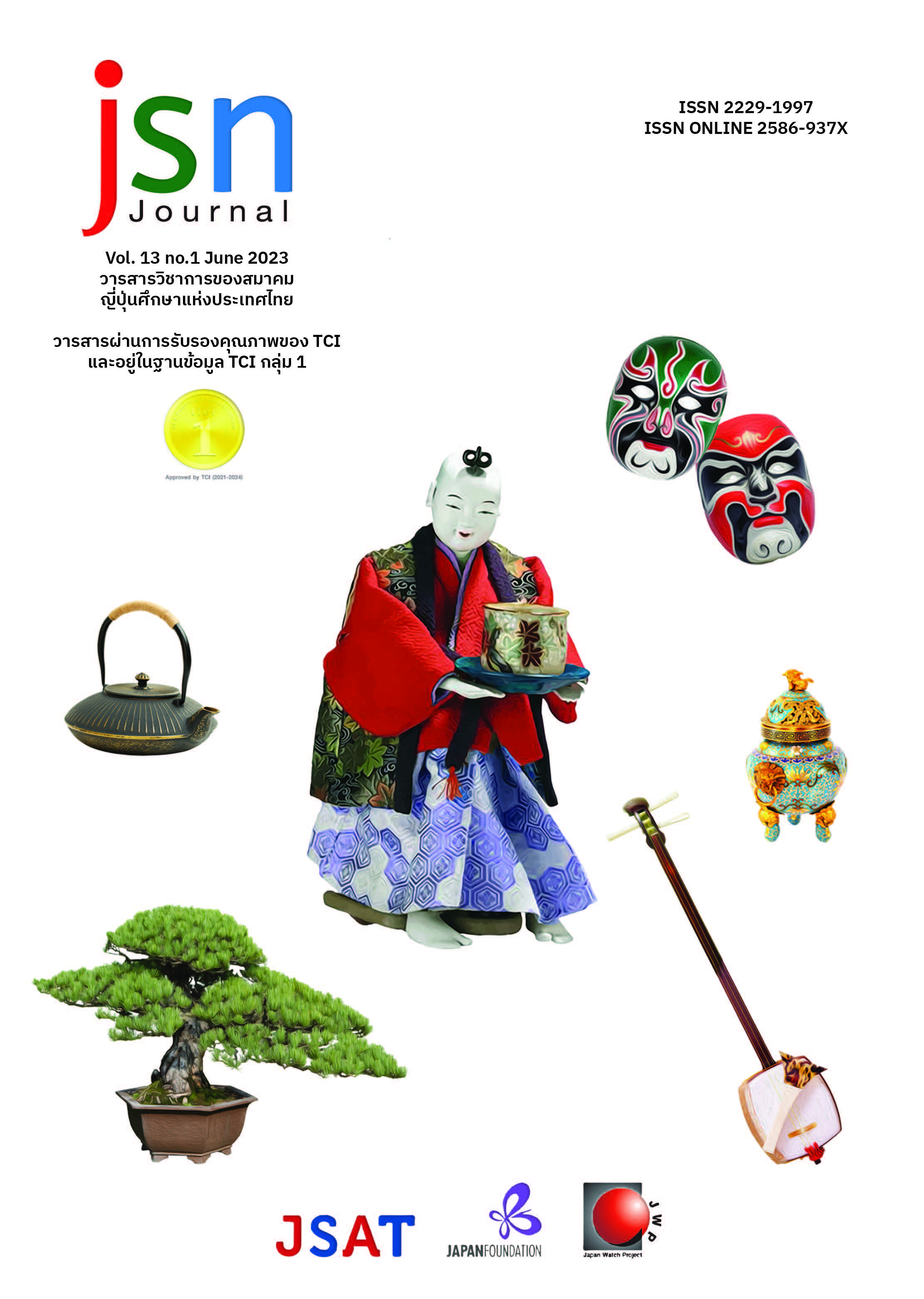Rapport Management through Thai and Japanese Apologetic Metapragmatic Comments
Main Article Content
Abstract
This research explores how Thai and Japanese interlocutors manage rapport through apologetic metapragmatic comments (AMC), reflecting the speaker’s awareness of the inappropriateness of their own language use. The aims of the study are to identify the communicative situations in which Thai and Japanese AMC are used in order to manage the relationship between the interlocutors. By using the data collected from interactions in Thai and Japanese TV dramas, the findings show that the AMC used in Thai data can be classified according to three categories: asking personal questions, refusing an invitation, and criticizing/complaining. In addition to the same situations found in Thai data, Japanese AMC are used further in the following five situations: complimenting, requesting, teasing, explaining or telling the speaker’s story, and suggesting. In most interactional situations, Japanese AMC are used when the hearer’s “right and obligation” (both “association right” and “equity right”) tend to be threatened by the speaker, while Thai AMC tend to be used when “face” threatening behavior has occurred. These results reveal some of the differences between Thai speakers’ face concerns and Japanese speakers’ interdependent self-construal in the interactions.
Article Details

This work is licensed under a Creative Commons Attribution-NonCommercial-NoDerivatives 4.0 International License.
ข้อความและข้อคิดเห็นต่างๆ ในบทความเป็นของผู้เขียนบทความนั้นๆ ไม่ใช่ความเห็นของกองบรรณาธิการหรือของวารสาร jsn Journal
References
ทัศนีย์ เมฆถาวรวัฒนา. (2556). ความหมายทางวัจนปฏิบัติศาสตร์ของคำว่า ขอโทษ ในภาษาไทย. วารสารพัฒนบริหารศาสตร์, 53(1), 221-239.
วรวรรณ เฟื่องขจรศักดิ์. (2548). ศึกษาเปรียบเทียบกลวิธีการขอโทษของคนญี่ปุ่นและคนไทย [วิทยานิพนธ์ปริญญามหาบัณฑิต]. มหาวิทยาลัยธรรมศาสตร์.
Aoki, A. (2010). Rapport management in Thai and Japanese social talk during group discussion. Pragmatics, 20(3), 289-313.
Coates, J. (2013). Women, men and everyday talk. Palgrave Macmillian.
Culpeper, J. (1996). Towards an anatomy of impoliteness. Journal of Pragmatics, 25, 349-367.
Culpeper, J. (2011). Impoliteness. Cambridge University Press.
Haugh, M. (2004). Revisiting the conceptualization of politeness in English and Japanese. Multilingua, 23, 1-28.
Holmes, J. (1986). Compliments and compliment responses in New Zealand English. Anthropological Linguistics, 28, 485-508.
Holmes, J. (2000). Politeness, power and provocation: How humour functions in the workplace. Discourse Studies, 2(2), 159-185.
Ide, R. (1998). “Sorry for your kindness”: Japanese interactional ritual in public discourse. Journal of Pragmatics, 29, 509-529.
Ide, S. (2005). How and why honorifics can signify dignity and elegance: The indexicality and reflexivity of linguistic rituals. In R. T. Lakoff & S. Ide (Eds.), Broadening the Horizon of Linguistic Politeness (pp. 45-64). John Benjamins.
Leech, G. (2014). The pragmatics of politeness. Oxford University Press.
Long, C. (2010). Apology in Japanese gratitude situations: The negotiation of interlocutor role-relations. Journal of Pragmatics, 42, 1060-1075.
Lucy, J. (1993). Reflexive language. Cambridge University Press.
Ohashi, J. (2013). Thanking and politeness in Japanese balancing acts in interaction. Palgrave Macmillan.
Owen, M. (1983). Apologies and remedial interchanges: A study of language use in social interaction. Mouton Publishes.
Pin-ngern, A. (2015). An interlanguage pragmatic study of Thai EFL learners’ apology: Linguistic realization and metapragmatic awareness. [doctoral dissertation]. Chulalongkorn University.
Pizziconi, B. (2007). Facework and multiple selves in apologetic metapragmatic comments in Japanese. In W. Bublitz & A. Hübler (Eds.), Metapragmatics in use (pp. 49-72). John Benjamins.
Spencer-Oatey, H. (ed.). (2000). Culturally speaking: Managing rapport through talk across cultures. Continuum.
Spencer-Oatey, H. (ed.). (2008). Culturally speaking: Culture, communication and politeness theory. Continuum.
Tanaka, N., Spencer-Oatey, H., & Cray, E. (2008). Apologies in Japanese and English. In H. Spencer-Oatey (ed.), Culturally Speaking: Culture, Communication and Politeness Theory (2nd edition) (pp. 73-94). Continuum.
Ukosakul, M. (2005). The significant of ‘face’ and politeness in social interaction as revealed through Thai ‘face’ idioms. In R. Lakoff & S. Ide (Eds.), Broadening the horizon of linguistic politeness (pp. 117-128). John Benjamins.
小川 治子(1995).「感謝とわびの定式表現--母語話者の使用実態の調査からの分析」『日本語学』85, 38-52.
杉戸清樹 (1989).「言語行動についてのきまりことば」『日本語学』8, 4-14.


